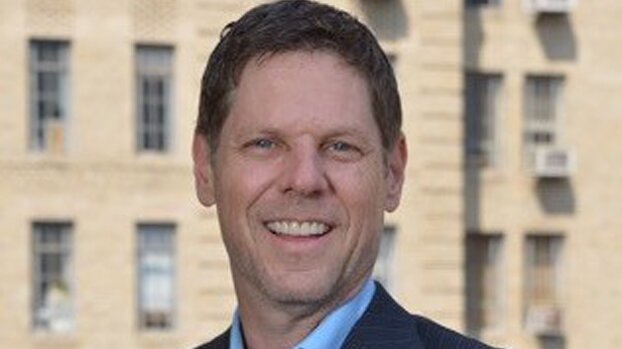
Eighty-four national flags jut out from the back wall of King’s Park International Church in Durham, North Carolina. Each flag represents the nationality of a church member, or a country where King’s Park engages in long-term ministry. Pastor Ron Lewis mentions his church’s international missions from the pulpit often. One week, when taking the offering, he notes: “This church is making an impact all across the world—China, the inner cities.”
This week, however, Pastor Ron isn’t preaching. Instead, he stands in the front row in blue jeans, a blazer, and a blue collared shirt. He has short, brown, combed-over hair that betrays just the slightest hint of gray.
As the twelve-member gospel band blasts through a worship set, Ron bobs up and down, lifts his hands in the air, and glances at his iPhone. His congregation likely understands—he’s probably checking in with his wife Lynette and their adorable twin daughters, his three grown sons; the pastors at King’s Park’s Raleigh, Chinese-language, or Spanish-language locations; or his co-pastors at the multi-site New York City church he also leads. Ron Lewis has borne much fruit, and his reach is growing—He and Lynnette were recently featured on the front cover of Charisma, a national Christian magazine.
Eventually, the music reaches a fever pitch. The band’s sanctified “woahs” float over the first ten rows of parishioners seated in a semicircle on ground-level and up the steep slope of plastic, red-cushioned chairs in the back. The music fills the auditorium with ease. When the band sings “There’s an army rising up!” the congregation erupts with cheers–apparently they’re the army.
When the final song ends, Pastor Ron saunters up to the pulpit. He welcomes his guests with news from King’s Park’s campus ministry’s weekend retreat. Ron declares that twenty students were baptized.
Senior Pastor Ron Lewis is a tough act for Senior Associate Pastor Reggie Roberson to follow. Reggie begins his sermon with a story about a village in India. There was a drought, and the local religious leaders had been sacrificing to all the many gods of the local religion, begging for rain to no avail. When a few missionaries showed up and screened a movie about Jesus to the villagers, it started raining. At the precise moment Jesus was nailed to the cross, the rain shifted from a gentle pitter patter to a thunderous downpour—the drought ended. The whole village erupted in cheers and a mass conversion event followed.
As Reggie preaches, Ron looks on intently. He seems proud of Reggie, and of Jesus; The whole village was converted, details be damned. At several points, the congregation applauds the unnamed missionaries—they helped evangelical Christianity triumph over the local religion, another victory.
When Ron takes the stage again, this time to give the benediction, it’s unsurprising that he launches into a story:
A few days ago, he was driving down the highway, talking with his son on the phone. He lost track of what he was doing, and ended up going way too fast. Police lights flickered behind him. Fortunately, Ron and the officer ended up having “just a great conversation.” Pastor Ron didn’t get a ticket. Ron tells the congregation that before he went off on his way, he got out of his car and popped the trunk; Not to prove that he didn’t have illegal substances, but to grab the officer a copy of Charisma.
“Now, folks, if that ain’t God’s favor I don’t know what is.”
Pastor Ron and his church are set on converting everyone—police officers, Indians, the Chinese, Russian Jews—one sermon, mission trip, and copy of Charisma at a time. Converting the world is an urgent task; It’s only by hearing the story of Jesus Christ and accepting him as Lord and Savior that one can escape the pits of hell and enjoy eternity in heaven. As long as people are getting converted, Ron and his congregation can take heart in knowing that they’re working hard as soldiers for God’s kingdom, and God’s kingdom always claims victory on its march through the kingdoms of men.
****************************************
Ron’s ambition is not unprecedented–pastors hailing from rural North Carolina have conquered the world before.
At the age of 16, Billy, the son of a dairy farmer, journeyed from his home just outside of Charlotte to a tent revival led by Dr. Mordecai Ham. Initially, Billy was put off by Ham’s assertion that he was a sinner, but eventually he came around, and wound up a preacher.
The Reverend Billy Graham’s take on the gospel, which simplified the message of Christ to its bare minimum—if you admit you’re a sinner, ask for forgiveness, and commit to following Christ, he will give you eternal life—was accessible to all. By 1956, Graham’s message had spread across the US, and he set his sights on the globe, first through a six-city tour of India. On the final day of his largest ever crusade, in South Korea, Graham preached to a crowd of 1.1 million.
It seems impossible that a young American preacher could see a picture of Graham preaching to a million potential converts in an exotic land and not feel the overwhelming pull of American, world-changing ambition. Pastor Ron describes Graham as a “standalone hero to everyone.”
Ron was converted after leaving his home in Greensboro to study at UNC Chapel Hill. He had no background in Christianity—his mother was Jewish—but a little old lady gifted him a Bible before he went away to school. It sat on his shelf until his curiosity got the best of him.
As he turned the pages, an obsession with Jesus Christ took hold, and he quickly found himself in need of guidance—he wanted to understand Christianity. He didn’t immediately look to celebrities like Graham. Instead, he turned to a Methodist pastor in his hometown of Greensboro who helped him along for a time.
Eventually, Ron found a new mentor—Rice Broocks, a campus minister at UNC. Like Graham, Lewis was unfettered by the traditional trappings of denomination and dogma—he admired Broocks because he was a powerful preacher, despite the fact that he was a part of the charismatic and controversial Maranatha Campus Ministries movement.
Now, as he seeks to lead his church in its quest to convert the globe, Ron reveres Graham. In a recent sermon, Pastor Ron reminisced about the times he and his brother mocked televangelists, only half-joking when he thanked God for not striking him down on the spot for laughing at Graham.
Throughout most of his career, Graham remained apolitical, serving as a spiritual advisor to politicians on either side of the aisle. Billy’s son, Franklin, however, makes headlines for his anti-Muslim, anti-LGBTQ+, and pro-Trump outbursts. Ron was recently invited to Franklin Graham’s office for a meeting with a state political leader. Ron insists they didn’t talk politics—he was only there to pray. Pastor Ron follows Billy’s example closely, refusing to pick a side when pressured by conservatives or liberals. Wrestling honestly and taking a conservative or liberal stance might alienate potential converts who disagree.
After President Trump announced his travel ban, Pastor Ron posted a new blog to his website titled “Syrian Refugee Opportunity.” It focused on Jordan Lewis Ministries’ (an evangelistic charity named after Ron’s deceased son) work in the Middle East, where “over 1000 refugees are meeting in hundreds of special Bible based discipleship groups spread across the region.” Last year, answering questions about House Bill 2 was difficult because Ron “just didn’t care about bathrooms.”
Whether employed as a copout to avoid honest discussion, or as the result of a genuine belief in the superiority of God’s kingdom, Billy Graham’s inoffensive, apolitical gospel is the fastest way to convert people around the world; Political beliefs, social issues, and the behavior of other Christians are prevented from influencing a potential convert’s decision about Christianity–regardless of the fact that a a religion is almost precisely a collection of behaviors and beliefs about social issues. And, convincing people around the world to accept Christianity is Ron Lewis’ calling.
Ron’s dismissiveness can come off as crass. Darrell, an ex-member of a campus ministry that fed into Ron’s church in the late 80’s, recalled the rage he felt when he confronted Ron over his disenchantment with the church’s aggressive ministry strategy, and his anger that members of the ministry (not Ron himself) had tried to bully him out of long-held liberal political beliefs.
According to Darrell, as he leveled his complaints, Ron smiled, interrupted him to say “bless you,” and then walked away–perhaps in a rush to find a soul he could win without answering any difficult questions.
****************************************
Ron has trotted across the globe, but often bringing God’s kingdom to earth means performing simple tasks in Durham.
Pastor Ron bends down, easing into an antique sofa, and introduces me to Mike, a Chinese pastor. A thick stack of Charisma magazines rests on the coffee table in front of them. There’s another stack on the counter in the back of the room, in front of some green plastic bottles of Perrier. Ron explains that Mike is “a pseudonym,” and tells me that Mike is a master at disciple-making. The two are clearly friends.
They’re shooting a video to thank a church in Nashville that has supported Mike’s ministry in China. Ron’s part of the video goes smoothly—he’s as charming in front of a camera as he is behind the pulpit. He tells the camera (and presumably the Nashville congregation) that they will “go down in history as making the difference with one of the unreached and unengaged people groups of the world.”
Mike seems to be doing well with his part, but after a minute or so Ron interrupts. He assures Brother Mike “you did great,” but wants him to move straight to the breakthrough. Mike pensively agrees, but he needs help identifying what the breakthrough is.
“Just tell them that the two brothers you trained reached their first two souls for Christ—Nashville people love the word souls.”
Mike and the woman filming want to start over, but since Pastor Ron has just given his best take yet, he insists the video should just pick up with Mike’s part. After another take from Mike, everyone is satisfied. Ron informs me that Mike is “one of my absolute best elders.”
Pastor Ron has to rush out to make it to lunch with Lynette and a few others, but as he leaves he makes sure to gift me a copy of Charisma. He explains why it’s so special: “It’s the first interview we’ve done since my son passed away, and they just did a great job capturing the story.”
The story Charisma captures is that of Ron and Lynette’s struggle to make sense of 23-year-old Jordan’s sudden death from cancer. The piece puts a positive spin on the tragedy, citing Lynnette’s survival of breast cancer and the couple’s adoption of two twin girls as evidence of God’s goodness. But the story makes clear that Ron hasn’t quite come to terms with his son’s death, or figured out how it fits into God’s plan. His eyes still flash with momentary pain when he mentions Jordan’s death, and over email, he introduces himself as the “father of four grown sons all married”, despite the fact that one of the four, Jordan, passed away, leaving his young wife Cady a widow (she would later remarry).
Pastor Ron Lewis is wounded. But that’s not to say he’s lost his faith; Ron still preaches with southern vigor and certainty, and he’s single-mindedly focused on expanding the kingdom of God.
In one sermon, Pastor Ron teases thirty year-old men who play video games. As he discusses biblical truths, he employs the words “cred,” “nutbag,” and “psycho.” When Jesus resists Satan’s temptations in the desert, the devil isn’t defeated—he “walks away like a whooped puppy with his tail between his legs.”
Near the end, Ron’s voice begins a steady ascent. It grows raspier with each word. By the sermon’s climax, he’s shouting:
“What Jesus did for us, He gives us the victory that He attained over the enemy so much so that the very armor of God that was on Jesus He puts on on us and we advance and we put Satan under our feet through Jesus Christ our Lord!”
Then, Ron’s voice drops to a whisper. He closes the sermon with scripture: 1 John 3:8. In the New Living Translation, “the Son of God came to destroy the works of the devil.” In the Ron Lewis Translation, The Son of God came to “destroy the rampant works of Satan worldwide.” The response to Christ’s victory is simple:
“We receive that. We receive that victory in our lives.”
Every week, the congregation trickles out of King’s Park victorious, having heard the good news. As I stumble through the parking lot, searching for the 2004 Land Cruiser I borrowed from my roommate, a young woman hustles past me in a leather jacket and brown boots, a copy of Charisma tucked under her right arm. Pastor Ron’s curved face stares out from the cover. He stands in front of an oversized white picket fence alongside his beautiful wife and adorable three-year old twin daughters, offering his smile to the huddled masses of trees, highways, and towns beyond the church parking lot.








